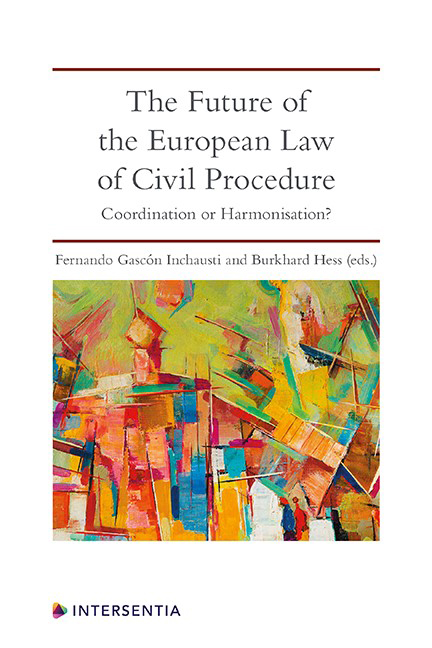Book contents
- Frontmatter
- Contents
- List of Cases
- List of Authors
- Introduction
- PART I METHODOLOGICAL APPROACHES
- PART II THE CURRENT SITUATION: VERTICAL AND HORIZONTAL HARMONISATION
- PART III CURRENT INITIATIVES FOR FURTHER HARMONISATION: The ELI/UNIDROIT Project
- The 2017 Directive Proposal on Common Minimum Standards of Civil Procedure
- Index
- ABOUT THE EDITORS
The 2017 Proposal of the European Parliament on Common Minimum Standards of Civil Procedure
Published online by Cambridge University Press: 23 July 2020
- Frontmatter
- Contents
- List of Cases
- List of Authors
- Introduction
- PART I METHODOLOGICAL APPROACHES
- PART II THE CURRENT SITUATION: VERTICAL AND HORIZONTAL HARMONISATION
- PART III CURRENT INITIATIVES FOR FURTHER HARMONISATION: The ELI/UNIDROIT Project
- The 2017 Directive Proposal on Common Minimum Standards of Civil Procedure
- Index
- ABOUT THE EDITORS
Summary
INTRODUCTION
On 4 July 2017, the European Parliament adopted a resolution “with recommendations to the Commission on common minimum standards of civil procedure in the European Union“. This project is a proposal for a directive and contains 28 articles on diverse aspects of civil procedure. The proposal deserves some attention because it represents the latest step towards procedural harmonisation in the EU. Procedural harmonisation in Europe has come a long way since the famous “Storme Commission‘s report“ of 1993. This report is, nowadays, widely known among European procedural comparatists but, in 1993, it went largely unnoticed, especially by the EU legislator. This “delayed glory“ can be explained by the fact that, in 1993, the European Union had no direct competence to legislate on civil procedure and the Member States ‘governments did not consider the field of civil justice as a political priority.
Both factors changed with the signature of the Amsterdam Treaty in 1997 and the Tampere Council conclusions of October 1999, where the Council expressed its wish to set up a “Genuine European Area of Justice“ with “greater convergence in civil law“. With this political mandate, the European Commission started to work intensively in the field of civil and commercial disputes. The first step was the “communautarisation“ of the Brussels Convention of 1968 with the Brussels Regulation, followed by the adoption of the Insolvency Regulation and several other instruments, mostly focusing on international competence and enforcement of foreign judgments. In the meantime, the Commission proposed to adopt genuine European procedures and published a green paper in 2002 on a European order for payment procedure. In this document, the Commission mentions the Storme Commission‘s report and describes it as a “ valuable point of reference and source of inspiration ”.
Since 2002, the European agenda on civil procedure has been well fulfilled and many instruments have been adopted, enhancing judicial cooperation and facilitating cross-border disputes. 10 Yet, European Union law has barely affected domestic procedures because of the absence of general legislative competence on this matter. EU procedural law also lacks a holistic regulation of civil procedure, at least nothing that comes close to the initial “European Judicial Code“ idea that was the basis for the Storme Commission‘s report.
- Type
- Chapter
- Information
- The Future of the European Law of Civil ProcedureCoordination or Harmonisation?, pp. 265 - 284Publisher: IntersentiaPrint publication year: 2020



